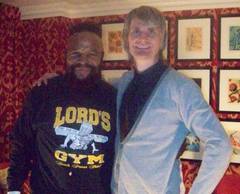Every church is different but there are common stories that come up. Here are a few of them:
1. A new twist on an old idea
|
Changing something that you do regularly can attract attention.
This baptism in a busy shopping centre was appealing to the press as it's unusual (see spotting a story). Could you change your nativity service so that it includes live animals? Could you hold your service in an unusual location to highlight a particular issue? |
|
2. A celebration
|
|
A landmark or a birthday is an easy story and can be used to promote a 'celebratory service' - such as a church's 80th birthday (left).
Local papers love history so a shot of the original building was dug out and a new picture was taken from a similar angle. |
3. Funny stories
|
Churches don't want to be the laughing stock but quirky stories are irresistible to a journalist and are the ones most likely to go national.
Ask yourself, what will we gain from this coverage before embarking on it? In this case, it was seen as quirky that a church was showing football instead of having a service. Of course, it attracted a good crowd on Sunday morning and an evangelism opportunity. |
4. A new arrival
A new vicar, a new youth worker or even a new toilet can make the news in some local papers.
However, to get into a half decent paper you need to think of an angle to make your arrival slightly more interesting than most.
It might be an amazing testimony or it might just be that you play the bongos...like this article from a Luton newspaper.
However, to get into a half decent paper you need to think of an angle to make your arrival slightly more interesting than most.
It might be an amazing testimony or it might just be that you play the bongos...like this article from a Luton newspaper.
5. Young people behaving themselves
|
|
Teenagers get almost as bad a press as the church so a story about them doing something positive is often newsworthy.
Youngsters raising money through a sponsored sleepover (left), organising a concert, embarking on a mission trip or campaigning against poverty could all make the paper. |
6. Human interest
People make stories.
Is there a parishioner who has survived an ordeal and wants to thank the church for its support and prayers? Has Mrs Miggins made it to every service for 50 years without missing a day? Is a man being married in the same church as his father and grandfather?
Is there a parishioner who has survived an ordeal and wants to thank the church for its support and prayers? Has Mrs Miggins made it to every service for 50 years without missing a day? Is a man being married in the same church as his father and grandfather?
7. A sponsored cycle
|
A vicar going from Lands End to John O'Groats on a bicycle to raise money for a leaky roof is not exactly original or unusual.
However, you can increase your chances by making yours slightly different. Could you pick a start and end point with a local significance? Or is there a human interest behind the fundraising like there is with this story from Bristol? |
8. Bricks and mortar
Stories about your church building may carry a local historical interest.
Has a new plaque been discovered during building work? Have peregrine falcons appeared in your roof space?
A minor warning though...if you're planning building work there's often at least one person locally who is opposed to it and your positive story could become negative.
Has a new plaque been discovered during building work? Have peregrine falcons appeared in your roof space?
A minor warning though...if you're planning building work there's often at least one person locally who is opposed to it and your positive story could become negative.
9. A celebrity visitor
|
A celebrity visitor isn't everything, unless it's the pope or bono (or Mr T).
However, it's certainly worth letting your local paper know even if you have a 'well known Christian author visiting'. Just don't expect a front page. |
10. A controversial comment
And finally...a word of warning.
If you wade into a debate on politics, ethics or morality then you will face the same kind of scrutiny that you would expect journalists to give to anyone else in a position of authority.
However, if you send out inoffensive, uncontroversial fluff (like most of the stories in the previous nine examples) then you are very unlikely to face any criticism, questioning or bad publicity.
If you are worried that your 'good news' will be twisted, take a look at your story in light of what makes a story and ask yourself if the most interesting 'angle' on your story is a positive one.
If you wade into a debate on politics, ethics or morality then you will face the same kind of scrutiny that you would expect journalists to give to anyone else in a position of authority.
However, if you send out inoffensive, uncontroversial fluff (like most of the stories in the previous nine examples) then you are very unlikely to face any criticism, questioning or bad publicity.
If you are worried that your 'good news' will be twisted, take a look at your story in light of what makes a story and ask yourself if the most interesting 'angle' on your story is a positive one.



